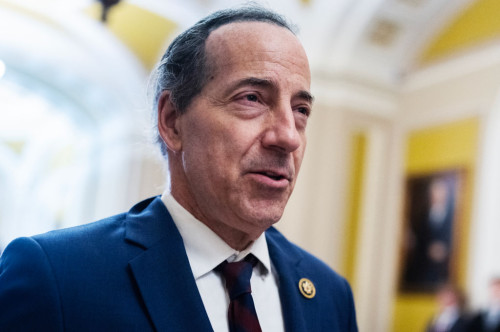
From the Center
Donald Trump’s first year of his second term took less than a week to complete. The new/old president launched an unprecedented blitzkrieg of executive orders and policy directives, threats and promises, hirings and firings and pardons that took Washington by storm in his first days in office. By contrast, the Democrats met with psychologists.
That last point may sound apocryphal. But the Punchbowl newsletter, the leading online journalism platform covering Capitol Hill, posted a story last Friday describing that Representative Jamie Raskin (D-MD), the ranking member of the House Judiciary Committee, did enlist two social psychologists to help them prepare for the new session.
“The purpose of the session, according to multiple attendees, was to counsel Democrats about how to approach conflict and effectively combat what Raskin described as ‘authoritarian styles of speech, ’” the newsletter reported. To be fair, that’s not all that congressional Democrats did last week. But consulting with the mental and emotional health experts does reflect the lack of direction with which the opposition party seems to be struggling as Trump mounts a full-out offensive on the Capitol, the Congress and the country.
Trump’s advisors are fond of the phrase “flooding the zone” to describe the sheer volume of their boss’ activity. By contrast, the Democrats are at best treading water. At worst, they are drowning.
Senate Majority Leader John Thune (R-SD) has seized on the Democratic disarray, moving forward almost immediately with legislation that would strengthen detention and deportation policy against undocumented immigrants of non-violent crimes. After an election in which Trump effectively used border and migration issues as a cudgel to attract support from swing voters and disengaged members of the electorate, Hill Republicans began the year by dividing their Democratic counterparts over the Laken Riley Act, a bill named after the Georgia college student who was murdered last year by an undocumented immigrant.
Democratic leaders Chuck Schumer and Hakeem Jeffries, sensitive to the damage that the immigration debate had done to their candidates in November, did not attempt to pressure their members to vote against the measure. As a result, an even dozen Democratic Senators supported the bill and 46 House members did the same, allowing it to pass by large bipartisan majorities before heading to Trump’s desk for his signature. But party progressives complained, arguing that their leaders had not made a sufficient effort to stop the conservative measure from moving forward. By the end of the week, Schumer was holding closed-door strategy sessions with his leadership team, Jeffries was advising his caucus to change the subject to inflation whenever possible, and Raskin was consulting psychologists.
The Democrats did manage to hang together on abortion policy. Thune followed up on the immigration proposal by introducing the Born Alive Abortion Survivors Protection Act, which would have prosecuted doctors for failing to resuscitate infants born alive after an attempted abortion. The bill failed to achieve the 60 vote threshold needed to close debate, as every Democratic senator opposed it. But it’s not clear whether Thune underestimated Democratic cohesion on an issue so critical to their base or whether he was simply pocketing votes to use in campaign commercials next year when Democrats from swing states like Georgia, Virginia, Michigan, and New Hampshire seek reelection.
The pace is not going to slow down anytime soon. The Senate will vote this week on legislation that would place stringent sanctions on the International Criminal Court. This arcane-sounding measure has become a key litmus test in the congressional debate over the Gaza War, as the sanctions would be issued in response to the ICC issuing arrest warrants against Israeli government and military officials. The war between Israel and Hamas has badly split Democrats, and this bill is very specifically designed to exploit those divisions.
Thune and his allies will continue to pursue these goals, on matters from energy to affirmative action, from taxes to transgender issues. This is the benefit that comes from holding even slim majorities on Capitol Hill, and is certainly not a new challenge for congressional minorities. But what is unique is the dominance that Trump holds over the political, cultural and media landscapes. And the Democrats appear to have few ideas on how to position themselves so they can fight back.
Want to talk about this topic more? Join Dan for his webinar, “The Dan Schnur Political Report." And read more of Dan’s writing at www.danschnurpolitics.com.
Dan Schnur is a Professor at the University of California – Berkeley, Pepperdine University, and the University of Southern California, where he teaches courses in politics, communications and leadership. Dan is a No Party Preference voter, but previously worked on four presidential and three gubernatorial campaigns, serving as the national Director of Communications for the 2000 presidential campaign of U.S. Senator John McCain and the chief media spokesman for California Governor Pete Wilson. He has a Center bias.
This piece was reviewed and edited by Clare Ashcraft, Bridging Coordinator & Media Analyst (Center bias).











